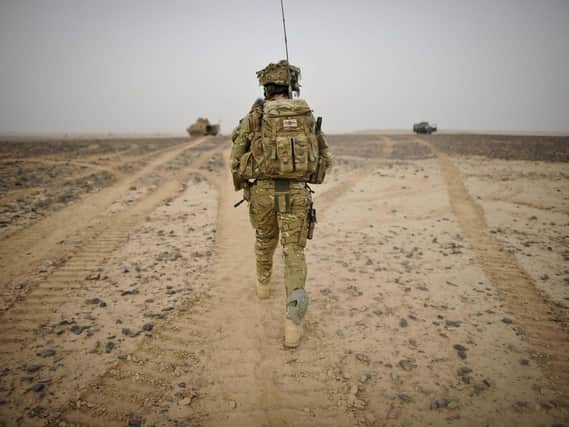"If I couldn’t speak to someone, I’d end up dead or in jail": Veteran bravely shares his story of homelessness before finding support from Catterick Garrison


Peter Manson served in the Highlanders Regiment in Northern Ireland and Germany between 1999 and 2006. After leaving the Army he moved to Canada where he was the victim of a carjacking incident at gunpoint.
The aftermath of the incident left Mr Manson with post-traumatic stress and his life took a downwards spiral after he decided to return to the UK.
Advertisement
Hide AdAdvertisement
Hide AdMr Manson became homeless, and was sleeping in his car in a McDonald’s car park, where he had to wake up every two hours to move it.
On Armed Forces Day 2019, which is marked on June 26 each year, he decided finally to seek help at an army event in Lincoln.
He said: “I felt like if I couldn’t speak to someone, I’d end up dead or in jail. I stood in front of the mental health tent for 15 minutes before I walked up to it. They asked if I was alright, and I broke down.”
Staff at the mental health tent quickly identified Mr Manson needed housing support, and found him a place at a project in Catterick Garrison, SPACES, which supports homeless veterans and those with mental health problems.
Advertisement
Hide AdAdvertisement
Hide AdMr Manson moved into his new one-bedroom flat at the Garrison just four days later.
He said: “A gentleman took me up to my room and put the key in the door. He asked me ‘what are you expecting here?’ and I said ‘just a bed’. He told me it was a one bedroom contained flat which was all mine. I nearly dropped to my knees.”
Mr Manson spent 16 months living in his new flat where he was able to access specialist support to help him open a bank account and claim benefits, as well as mental health therapy. He also found a new passion for woodwork, which he is now passing on to his fellow veterans through workshops.
And now a Yorkshire project to end homelessness in veterans has received a funding boost, with plans to create a roadmap to ensure all have access to safe housing.
Advertisement
Hide AdAdvertisement
Hide AdBetween 100 and 400 veterans sleep rough every year, with fears that that number may increase after the pandemic, with up to 4000 facing homelessness.
Riverside – one of the UK’s largest providers of accommodation for people affected by homelessness – and the University of York’s Centre for Housing Policy have joined forces to research the issue and to create an action plan to rectify homelessness.
The research project will interview more than 100 veterans to compare their experiences transferring back into civilian life, as well as exploring the current provision and effectiveness of housing related information and advice to the Armed Forces Community.
It will seek to understand where the risk for homelessness begins on someone’s journey from joining the army to transferring back into civilian life.
Advertisement
Hide AdAdvertisement
Hide AdThe Forces in Mind Trust, a specialist charity that supports veterans after they leave the army, has granted the project £219,240 in funding after their research showed that the cost to the Treasury of veterans failing to transition back to civilian life is around £25m.
Lee Buss, Director of Operations and Group Veterans Lead for the Riverside Group, said: “This exciting research is the first time that the journey from someone joining the military through to them experiencing homelessness will have been mapped out.
“Mapping this journey out will enable us to analyse the points where the right interventions could have enabled a military veteran to avoid homelessness and therefore put us in the best position to eradicate homelessness for veterans.”
The project has been announced to co-incide with Armed Forces Day, which is marked today.
Advertisement
Hide AdAdvertisement
Hide AdThe Government’s strategy for veterans, published in 2018, sets out ambitions for every ex-member of the Armed Forces to “have a secure place to live either through buying, renting, or social housing”.
Catterick Garrison’s The Beacon project is run by Riverside and aims to help veterans transfer back into civilian life.
And Mr Manson is determined that more people can be helped by projects such as the Beacon.
He said: “You’d be surprised about what help is available out there. Don’t be afraid to ask, no one is going to judge you. There’s still a stigma but once you take that first step, you’ll start healing.”
Anyone with concerns about a veteran threatened with homelessness can contact the SPACES helpline on 01748 833797 for details on accessing support including money advice and health services.
Comment Guidelines
National World encourages reader discussion on our stories. User feedback, insights and back-and-forth exchanges add a rich layer of context to reporting. Please review our Community Guidelines before commenting.